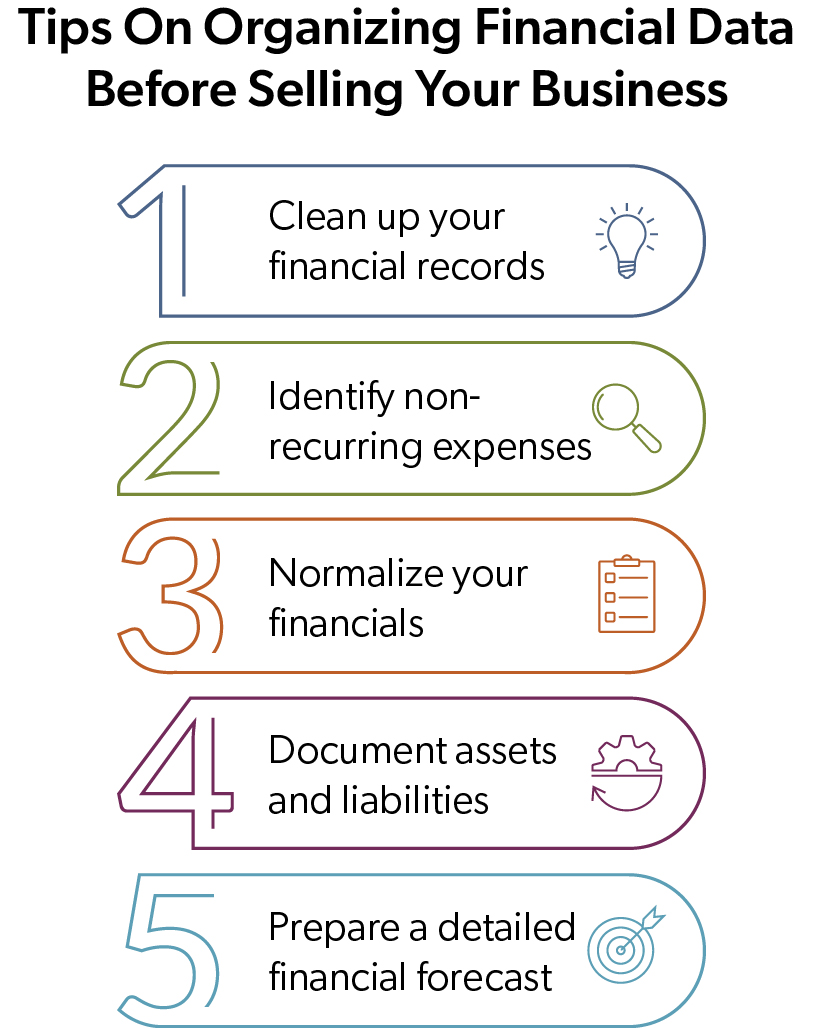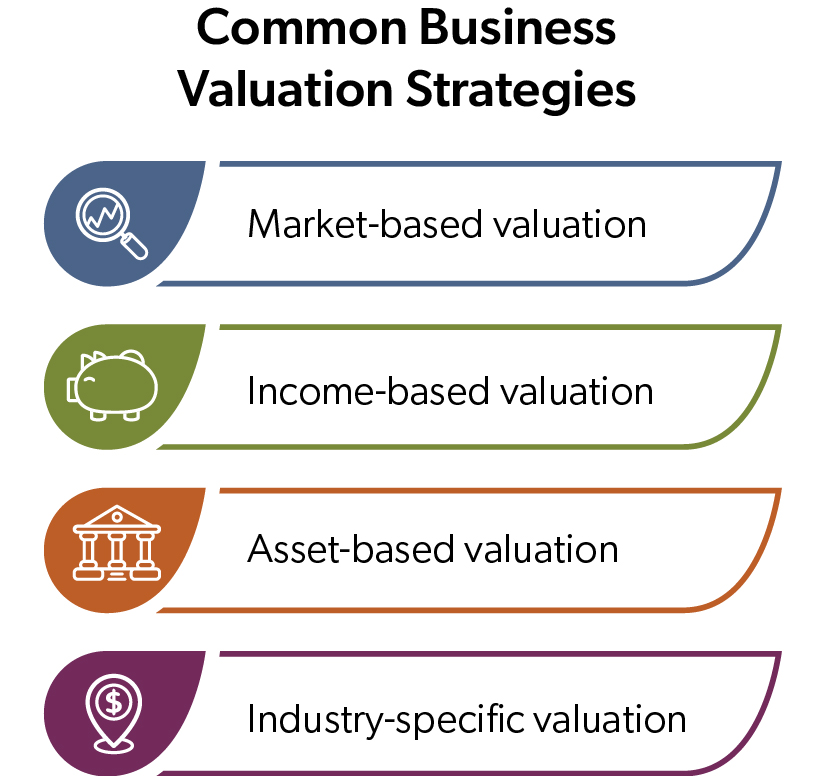Preparing to sell your business is a complex undertaking that demands careful planning and strategic execution. For seasoned business owners and entrepreneurs, the process entails several components, including organizing your financial records with precision, evaluating various business valuation methods to determine your company’s worth, carefully timing the sale to maximize profitability, and understanding the timeline of the sales process.
Additionally, enlisting the expertise of financial advisors, business brokers, and legal/tax counsel sets you up for a successful transaction and helps you protect your personal wealth. After all, for the majority of business owners — 80% to 90%, according to the Exit Planning Institute — most of their wealth is tied to their businesses.
In this article, Jessica Colby, Vice President – Wealth Advisor at First Business Bank, provides insight into the process behind selling a business and actionable ways to maximize its value and get the most from your years of effort and dedication.
Organizing Your Finances Before Selling Your Business
Before selling your business, it is crucial to get your finances in order. Organizing your financial data streamlines the selling process and allows you to fully demonstrate the true value to potential buyers.
 “Organizing your financial data before selling your business is a strategic imperative,” says Colby. “It’s part of having a well-documented roadmap for potential buyers, guiding them toward a confident and informed decision. Messy finances can introduce unnecessary risk and uncertainty into the transaction, potentially costing you both time and money.”
“Organizing your financial data before selling your business is a strategic imperative,” says Colby. “It’s part of having a well-documented roadmap for potential buyers, guiding them toward a confident and informed decision. Messy finances can introduce unnecessary risk and uncertainty into the transaction, potentially costing you both time and money.”
She suggests setting aside time, working with your Controller/CFO and possibly your CPA, to:
Clean Up Your Financial Records: Begin by meticulously reviewing and cleaning up your financial records. Ensure that your income statements, balance sheets, and cash flow statements are accurate, up-to-date, and well-organized. Address any discrepancies or outstanding financial issues.
Identify Non-Recurring Expenses: Distinguish between recurring and non-recurring expenses. Buyers are primarily interested in the recurring profitability of your business, so make sure to highlight the sustainable earnings and adjust for any exceptional, one-time costs.
Normalize Your Financials: Normalize your financial statements to reflect the true earning potential of your business. This might involve adjusting owner’s salaries, discretionary expenses, or non-operational items to provide a more accurate picture of your company’s profitability.
Document Assets and Liabilities: Create a comprehensive list of all your assets and liabilities. Ensure that your business assets are well-maintained and be ready to provide documentation for any outstanding debts or obligations.
Prepare a Detailed Financial Forecast: Develop a well-reasoned financial forecast that outlines your business’s future earnings potential. Buyers will want a clear path to profitability, so be prepared to substantiate a realistic projection.
“By organizing your financials, you smooth the due diligence process and give the potential buyers more confidence about the financial health of your business,” Colby says. “This proactive approach sets the stage for a successful sale and maximizes the value and wealth you can get from your business.”
Choosing The Right Business Valuation Strategy
Determining the value of your business is not a one-size-fits-all process. Several approaches exist, each with its own nuances and considerations. Understanding these basic valuation methods and selecting the most appropriate one for your unique circumstances can significantly impact the outcome of your sale.
 “Business valuation is about translating your company’s unique attributes into a compelling and accurate financial picture,” Colby says. “The choice you make can be the difference between a fair deal and a lucrative one.
“Business valuation is about translating your company’s unique attributes into a compelling and accurate financial picture,” Colby says. “The choice you make can be the difference between a fair deal and a lucrative one.
Choose wisely, and you’ll not only maximize your sale price but also expedite the process, ensuring a smoother transition for all parties involved.”
Here are a few valuation approaches and insights on how to evaluate which one aligns best with your objectives before embarking on the sale journey. You can also work with a trusted business valuation expert who can help you select the right model and help value your business.
Market-Based Valuation: This approach assesses your business’s worth by comparing it to similar companies that have recently sold. Analyzing market data allows you to gauge where your business stands in the current competitive landscape. A market-based valuation can be particularly useful to value businesses in well-defined industries with a history of sales data. Potential negatives of this approach are that it can be difficult to find comparable businesses and, even if you do, market conditions may have changed since their sale.
Income-Based Valuation: Income-based valuation methods, such as the discounted cash flow (DCF) analysis, focus on future cash flows your business is expected to generate. By discounting these projected earnings back to their present value, you can determine the business’s current value. This approach is valuable when your company has consistent cash flow patterns. A potential pitfall of this approach is that it can be challenging to get accurate future revenue projections and fully assess the income potential of your tangible assets.
Asset-Based Valuation: Asset-based valuation calculates your business’s worth based on its tangible and intangible assets minus liabilities. This method is often used for businesses with valuable physical assets or intellectual property. It’s a reliable approach when the market or income-based methods might not accurately reflect your business’s value. A downside of this approach is that it may undervalue future income potential and intangible assets.
Industry-Specific Methods: Some industries have specialized valuation methods tailored to their unique characteristics. For instance, the EBITDA (Earnings Before Interest, Taxes, Depreciation, and Amortization) multiple is frequently used in the technology sector. Familiarize yourself with industry-specific practices to make an informed choice. “Before selecting a valuation method, make sure to consider your industry, company size, financial performance, growth prospects, and market conditions, too,” Colby says. “Ultimately, you, or your business valuation expert, should choose one that matches your goal, whether that’s to maximize the sale price, accelerate the sale, or achieve a balanced outcome that benefits you and the buyer.” By carefully evaluating these valuation approaches and seeking expert guidance, you can ensure that your business is priced correctly in the market, optimizing your chances of a successful and lucrative sale.
When Is The Best Time For Selling A Business?
As many business owners can attest, timing your business sale can significantly influence its ultimate value and success. While no one can tell you when the best time is to sell, understanding the variables and how they work together can help you make an informed decision.
“Selling at the right moment can mean the difference between securing your financial future and leaving opportunities on the table,” Colby says. “It can profoundly impact your personal wealth profile. Timing is not about rushing; it’s about waiting for the right moment to maximize your wealth and secure the best deal possible.”
According to the Federal Reserve, business exits typically rise in recessions, and this seems to have held true during the most recent recession. Often-cited statistics say that 8 out of 10 businesses don’t sell, whether because something happens and the business goes under first or there’s a mismatch between what the business owner expects to sell for and what a buyer will pay. Other times, sellers aren’t ready to exit the business when an opportunity comes along.
Think about these factors related to timing the sale of a business:
Market Conditions: Economic performance in your industry and the state of the economy as a whole will often heavily impact the timing of your business sale. A strong, growing market often yields higher sale prices as more buyers actively seek opportunities. Conversely, during economic downturns, it may be advisable to wait until conditions improve.
Business Performance and Growth: Your business’s financial health and growth story play a crucial role. A track record of consistent revenue and earnings growth can make your business more attractive to potential buyers. It’s usually more lucrative and advantageous to sell when your company is on an upswing rather than during a decline.
Personal Timing and Objectives: Are you ready to retire, pursue other ventures, or simply move on to a new chapter in life? Your personal timeline can greatly influence the timing of the sale. Sometimes, a buyer comes along when you’re not personally ready, but if everything else is in place, it might be the best time to sell after all.
The Sale Process Timeline: As you can already imagine, selling a business doesn’t happen overnight. It typically takes several months, and often longer, to complete a sale – sometimes a year or more, depending on the specific circumstances and complexity of the transaction. Preparing your business for sale, finding the right buyer, negotiating terms, and conducting due diligence all require time. Focus on the items you can control, such as organizing your financials, selecting your professional team, and be patient with the process.
Finding The Right Partners To Help Sell Your Business
Once you’ve decided the time is right or your business has interest from a buyer, it’s time to evaluate outside experts who can help you navigate the selling process. Business brokers, business valuation experts, and other trusted advisors can profoundly impact the outcome of your sale, so it’s important to select partners who align with your goals and share your commitment to maximizing value.
“Selecting the right advisors to help you sell your business is a critical step in safeguarding your wealth,” Colby says. “You definitely need someone with expertise, but even more so, it’s about trust, alignment, and a shared commitment to your financial success. Their guidance can make or break your deal, so choose your team thoughtfully and strategically.”
When evaluating potential advisors to help you sell your business, Colby urges her clients to consider evaluating them with these criteria to make sure they get the right fit:
Industry Experience: Look for professionals with an in-depth knowledge of, and network in, your industry. Familiarity with industry trends, regulations, and market dynamics can be invaluable in positioning your business for a successful sale.
Track Record of Success: Review their track record. Have they successfully facilitated similar transactions in the past? Request references from clients with completed transactions to gauge their ability to deliver results.
Network and Connections: Professionals with an extensive network of potential buyers and industry contacts can help you access a broader pool of qualified purchasers and increase your chances of securing a lucrative deal.
Communication Skills: Now is not the time to work with experts who are anything less than transparent. Choose advisors who can clearly convey complex information, provide regular updates, tell you upfront how much their services cost, and address your concerns promptly.
Trust and Compatibility: The proceeds of selling your business may be the legacy you leave for generations to come, so building trust with your outside advisors is paramount. You should feel comfortable discussing sensitive financial matters and strategic decisions with them. A strong personal and professional rapport fosters collaboration and problem-solving.
Aligning Goals: Successful collaboration with your chosen advisors hinges on aligning goals and expectations. Openly discuss your objectives for the sale, such as maximizing profit, preserving the legacy of your business, or ensuring a smooth transition for employees. Make sure that your advisors understand and support these objectives before contracting with them.
In the journey of selling your business, preparation and strategic decision-making are key to unlocking its maximum value. From organizing your financial records to selecting the right valuation strategy and evaluating the optimal timing, these steps set the stage for a successful sale. However, partnering with the right professionals is equally crucial. If you’re thinking about selling your business, be sure to take these extra steps to protect your wealth. Our Private Wealth experts are here to guide you through this complex journey and ensure your success in maximizing the value of your legacy.





